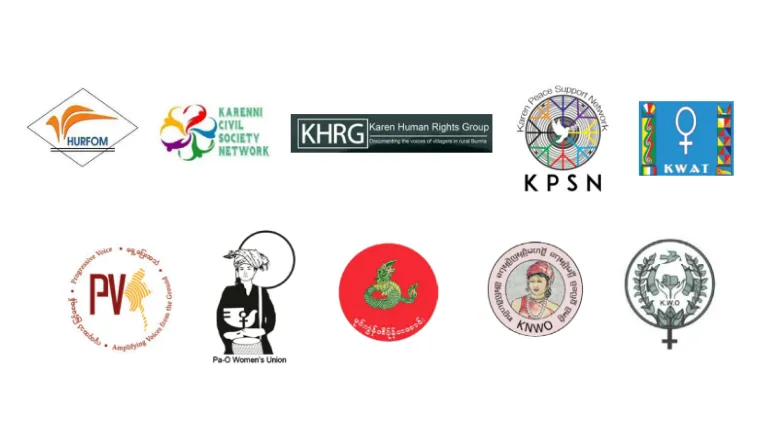Myanmar needs a ‘do no harm’ solidarity-based approach to humanitarian aid
07 September 2021

[7 September 2021] Donors and international humanitarian organizations must ensure conflict sensitivity and employ a ‘do no harm’ solidarity-based approach to provision of humanitarian aid in Myanmar said 10 organizations. Aid must be sensitive to human rights protection and provided through cross-border channels, local humanitarian and medical networks, ethnic health and aid providers, community-based and civil society organizations, said the groups.
“It is not the moral mountaintop to profess ‘neutrality’ when there is nothing neutral about partnering with the military junta in providing aid. They are the root causes of the multiple crises currently facing Myanmar and the very perpetrators of grave crimes and drivers of the mass displacements,” said Nai Aue Mon of Human Rights Foundation of Monland. “What we need is a ‘do no harm’ approach to aid that is centered around local communities with the commitment, expertise, capacity and the successful track record of working tirelessly to address the problem.”
The groups jointly released a briefing paper “Nowhere to Run: Deepening Humanitarian Crisis in Myanmar” encapsulating the deepening humanitarian crisis in Myanmar over the past seven months following the illegal coup attempt in February. The briefing paper highlights key insights from ethnic community representatives on how humanitarian aid can be effectively distributed within the ethnic regions and through local actors.
Those interviewed for the briefing paper expressed difficulties in accessing funds due to strict donor regulations and called on donors to be flexible, fast track applications and remove bureaucratic barriers to accessing funds during this humanitarian emergency.
“Strict donor regulations make it extremely difficult for local community representatives to access emergency funds that could save the lives of the people of Myanmar,” said Saw Alex of Karen Peace Support Network. “We built local community structures that have supported local people for decades through civil war and previous dictatorships. Donors and INGOs must ensure conflict sensitivity and support existing local community structures that are driving solutions to the current humanitarian crisis.”
The briefing paper points to how the junta has continued to weaponize humanitarian aid to its advantage by withholding, restricting, or even destroying the delivery of aid and have instrumentalized assistance to further its own narrative as protector of the people. Sections of the paper focuses on the humanitarian situation of Kachin, Karen, Shan, Karenni, Chin, and Rakhine States, while touching on central and southern Myanmar as the devastating consequences of military’s campaign of terror including displacement, shortages of food, job losses, livelihood hardships, and lack of adequate healthcare to combat COVID-19 is felt nationwide.
“There is a lot of talk and expectation placed on ASEAN and the AHA Centre to lead the humanitarian response, but they lack the independence and capacity to handle a humanitarian crisis of this scale,” said Khin Ohmar of Progressive Voice. “ASEAN alone cannot tackle the human rights and humanitarian crises that are unfolding in Myanmar. These crises have been created by the military junta and thus partnering or working with the junta will bring more harm to the Myanmar people. ASEAN must seek out a UN coordinated response that is centered on creating equal partnerships with local organizations, respecting their expertise, agency and legitimacy to serve their communities.”
To solve these multiple crises effectively and sustainably, AHA Centre, UN, donors and other international actors must engage meaningfully with the civil society organizations, community-based organizations and ethnic health and aid providers on the ground that are fully capable of providing to aid the communities they serve and strengthen these services through bottoms-up agency and decision-making, rather than relying on those who are the root cause of the humanitarian catastrophe, the groups said.
Editor’s Note:
- See the briefing paper Nowhere to Run: Deepening Humanitarian Crisis in Myanmar here: https://bit.ly/3tiwGIc
For more information, please contact:
- Khin Ohmar, Progressive Voice, [email protected]
- Saw Alex, Karen Peace Support Network, [email protected]
- Nai Aue Mon, Human Rights Foundation of Monland, [email protected]
Announcements
21 May 2025
Open letter: Malaysia must lead ASEAN with principle, not hypocrisy, to address the Myanmar crisis

Progressive Voice is a participatory rights-based policy research and advocacy organization rooted in civil society, that maintains strong networks and relationships with grassroots organizations and community-based organizations throughout Myanmar. It acts as a bridge to the international community and international policymakers by amplifying voices from the ground, and advocating for a rights-based policy narrative.